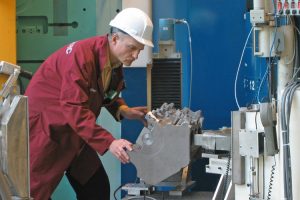
Stress data from the CNBC led to a further project to develop manufacturing methods to optimise performance of lightweight alloys for car engines.
Source: Canadian Neutron Beam Centre (CNBC)
Contact: cnbc@cnl.ca
Image: Thesupermat
Taking care of our environment, improving the fuel efficiency of cars, and promoting competitiveness of Canadian industry are Canadian priorities.
For Canadian manufacturers that export vehicles and parts to remain competitive, they must be able to meet regulatory changes abroad. Beginning with 2017 models, the United States is requiring a 50% improvement over today’s passenger vehicles by 2025. Innovations that optimise performance and prolong the life of lightweight engines are needed to meet these standards. Manufacturing techniques for casting and forming light metals, such as aluminium, must be better understood and redesigned.

Studying the performance of aluminium in this prototype engine block for Nemak Inc.
This is the goal of an AUTO21-funded research team comprising two automotive companies (Nemak Inc. and General Motors), three universities (Ryerson, UBC and Waterloo), and two government labs (Canmet Materials and the CNBC). The team seeks to understand the small-scale effects of each stage of the manufacturing cycle on the metal, to guide predictions for improving the resulting material, and then to confirm the predictions by experiments. Stress measurements at CNBC over the past two years produced very clear information about the effectiveness of stress relief in engine manufacturing, such as heat treatment.
“Residual stress measurements through neutron diffraction experiments at CNBC enabled an enhanced and more lucid understanding of the stress distribution and microstructural aspects of our research on engine blocks,” explains Professor Ravindran. “The partnership between Ryerson University, Nemak Canada and CNBC has resulted in outcomes far exceeding our initial targets.”
“This is a vital contribution to the overall project that complements studies of metal microstructure, mechanical testing and computer modeling by our AUTO21 research team,” says Dr. Robert MacKay, casting and heat treatment specialist from Nemak Inc.
The knowledge gained has led to a second phase of the project over the next two years; that is, to develop advanced casting technologies and heat treatment processes to optimise the performance of lightweight alloys that may ultimately be used in various automotive powertrain components, such as cylinder heads, engine blocks, and transmission cases. For this second phase of the project, the AUTO21 team is leveraging contributions from the industry valued at $240,000 and from government labs valued at $380,000.
